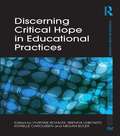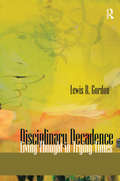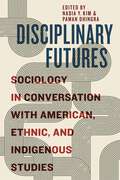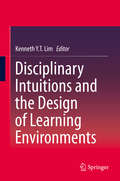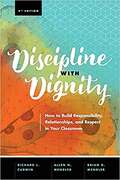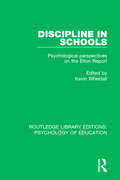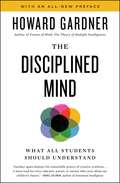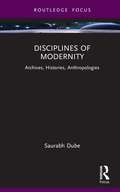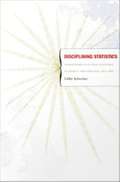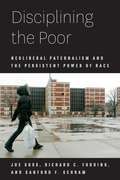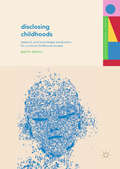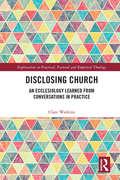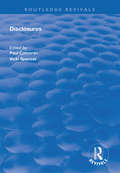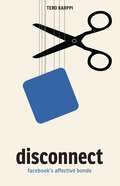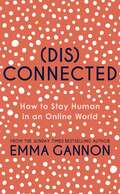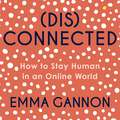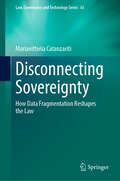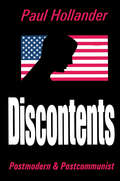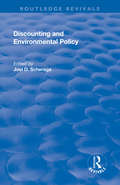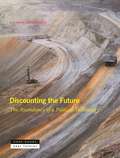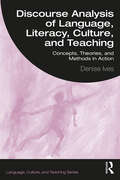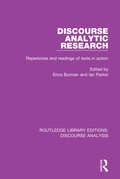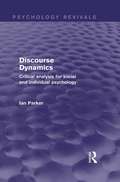- Table View
- List View
Disbelief: The Origins of Atheism in a Religious Species
by Will M. Gervais Ph.DDoes God exist? This straightforward question has spawned endless debate, ranging from apologists&’ supposed proofs of God&’s existence to New Atheist manifestos declaring belief in God a harmful delusion. In Disbelief, Will M. Gervais, Phd., a global leader in the psychological study of atheism, shows that the ubiquity of religious belief and the peculiarities of atheism are connected pieces in the puzzle of human nature.It&’s undeniable that religion is a core tenet of human nature. It is also true that our overwhelmingly religious species is also as atheistic as it&’s ever been. Yet, no scientific understanding of religion is complete without accounting for those who actively do not believe. In this refreshing and revelatory book, Gervais argues that religion is not an evolutionary puzzle so much as two evolutionary puzzles that can only be solved together. First is the Puzzle of Faith: the puzzle of how Homo sapiens – and Homo sapiens alone – came to be a religious species. Second is the Puzzle of Atheism: how disbelief in gods can exist within our uniquely religious species. The result is a radically cohesive theory of both faith and atheism, showing how we became a uniquely religious species, and why many are now abandoning their belief.Through a firsthand account of breakthroughs in the scientific study of atheism, including key findings from cognitive science, cultural evolution, and evolutionary psychology, Disbelief forces a rethinking of the prevailing theories of religion and reminds both believers and atheists of the shared psychologies that set them on their distinct religious trajectories. In casual prose and with compelling examples, Gervais explains how we became religious, why we&’re leaving faith behind, and how we can get along with others across the religious divides we&’ve culturally evolved.
Discerning Critical Hope in Educational Practices (Foundations and Futures of Education)
by Vivienne Bozalek Brenda Leibowitz Ronelle Carolissen Megan BolerHow can discerning critical hope enable us to develop innovative forms of teaching, learning and social practices that begin to address issues of marginalization, privilege and access across different contexts? At this millennial point in history, questions of cynicism, despair and hope arise at every turn, especially within areas of research into social justice and the struggle for transformation in education. While a sense of fatalism and despair is easily recognizable, establishing compelling bases for hope is more difficult. This book addresses the absence of sustained analyses of hope that simultaneously recognize the hard edges of why we despair. The volume posits the notion of critical hope not only as conceptual and theoretical, but also as an action-oriented response to despair. Our notion of critical hope is used in two ways: it is used firstly as a unitary concept which cannot be disaggregated into either hopefulness or criticality, and secondly, as an analytical concept, where critical hope is engaged and diversely theorized in ways that recognize aspects of individual and collective directions of critical hope. The book is divided into four sub-sections: Critical Hope in Education Critical Hope and a Critique of Neoliberalism Critical Race Theory/Postcolonial Perspectives on Critical Hope Philosophical Overviews of Critical Hope. Education can be a purveyor of critical hope, but it also requires critical hope so that it, as a sector itself, can be transformative. With contributions from international experts in the field, the book will be of value to all academics and practitioners working in the field of education.
Disciplinary Decadence: Living Thought in Trying Times
by Lewis R. GordonIn this book, philosopher and social critic Lewis Gordon explores the ossification of disciplines, which he calls disciplinary decadence. In response, he offers a theory of what he calls a teleological suspension of disciplinarity, in which he encourages scholars and lay intellectuals to pay attention to the openness of ideas and purposes on which their disciplines were born. Gordon builds his case through discussions of philosophy of education, problems of secularization in religious thought, obligations across generations, notions of invention in the study of ideas, decadence in development, colonial epistemologies, and the quest for a genuine postcolonial language. These topics are examined with the underlying diagnosis of the present political and academic environment as one in which it is indecent to think.
Disciplinary Futures: Sociology in Conversation with American, Ethnic, and Indigenous Studies
by Pawan Dhingra Nadia Y. KimReimagines how race, ethnicity, imperialism, and colonialism can be central to social science researchand methodsThere is a growing consensus that the discipline of sociology and the social sciences broadly need to engage more thoroughly with the legacy and the present day of colonialism, Indigenous/settler colonialism, imperialism, and racial capitalism in the United States and globally. In Disciplinary Futures, a cross-section of scholars comes together to engage sociology and the social sciences by way of these paradigms, particularly from the influence of disciplines of American, Ethnic, and Indigenous Studies.With original essays from scholars such as Yến Lê Espiritu, Sunaina Maira, Hōkūlani K. Aikau, Salvador Vidal-Ortiz, Ben Carrington, Yvonne Sherwood, and Gilda L. Ochoa, among others, Disciplinary Futures offers concrete pathways for how the social sciences can expand from the limiting frameworks they traditionally use to study race and racism, namely: the black-white binary, the privileging of the nation-state, the fixation on the US mainland, the underappreciation of post- and settler-colonial studies, the liberal assumptions, and the limited conception of what constitutes data. In turn, the contributors reveal that sociology has many useful questions, methodologies, and approaches to offer scholars of American, Ethnic, and Indigenous Studies. Disciplinary Futuresis an important work, one which renders these disciplines more intellectually expansive and thus better able to tackle urgent issues of injustice.
Disciplinary Intuitions and the Design of Learning Environments
by Kenneth Y. T. LimMany of the chapters within draw frequent and explicit linkages to curriculum design, from the premise of the need to go beyond addressing the conceptions of learners, to seeking to understand the substrate upon which these conceptions are founded. The argument is made that this substrate comprises the particular set of lived experiences of each learner, and how - because these lived experiences are as tacit as they are diverse - designing curriculum around misconceptions and preconceptions alone would not lead to enduring understanding from first principles. From this perspective, Disciplinary Intuitions constitute an exciting field at the nexus of learning theories and curriculum design.
Discipline With Dignity, 4th Edition: How To Build Responsibility, Relationships, And Respect In Your Classroom
by Brian D. Mendler Richard L. Curwin Allen N. MendlerIn this revised and updated 4th edition, Discipline with Dignity provides in-depth guidance for implementing a proven approach to classroom management that can help students make better choices and teachers be more effective. Emphasizing the importance of mutual respect and self-control, the authors offer specific strategies and techniques for building strong relationships with disruptive students and countering the toxic social circumstances that affect many of them, including dysfunctional families, gangs, and poverty. Educators at all levels can learn The difference between formal and informal discipline systems and when to use each. The role of values, rules, and consequences. How to address the underlying causes of discipline problems that occur both in and out of school. What teachers can do to defuse or prevent classroom disruptions and disrespectful behavior without removing students from the classroom. Why traditional approaches such as threats, punishments, and rewards are ineffective—and what to do instead. How to use relevance, teacher enthusiasm, choice, and other elements of curriculum and instruction to motivate students. How to reduce both teacher and student stress that can trigger power struggles. With dozens of specific examples of student-teacher interactions, Discipline with Dignity illustrates what you can do—and not do—to make the classroom a place where students learn and teachers maintain control in a nonconfrontational way. The goal is success for all, in schools that thrive.
Discipline in Schools: Psychological Perspectives on the Elton Report (Routledge Library Editions: Psychology of Education)
by Kevin WheldallWhat can schools and teachers do to promote discipline in the classroom? How do discipline and learning interact? The Elton Committee was set up in 1989 to consider ‘what action can be taken to secure the orderly atmosphere necessary in schools for effective teaching and learning to take place’. In this collection of papers, originally published in 1992, ten leading figures in the psychology of education reflect on some of the issues raised by the Elton Report and provide a series of psychological models for tackling problems of discipline, disorder and disruption in schools. Areas covered include whole-school approaches to discipline, the connection between learning difficulties and discipline problems, the effectiveness of positive behavioural methods of classroom management, the possible uses of techniques derived from family therapy in classroom discipline situations and the ‘good relationship’ between teacher and student as an agent of change. Though the perspectives of the contributors are very different, the emphasis throughout is on establishing a way forward for schools that will be valid and workable both in institutional terms and for the individual teacher in the classroom.
Disciplined Mind: What All Students Should Understand
by Howard GardnerThis brilliant and revolutionary theory of multiple intelligences reexamines the goals of education to support a more educated society for future generations.Howard Gardner&’s concept of multiple intelligences has been hailed as perhaps the most profound insight into education since the work of Jerome Bruner, Jean Piaget, and even John Dewey. Here, in The Disciplined Mind, Garner pulls together the threads of his previous works and looks beyond such issues as charters, vouchers, unions, and affirmative action in order to explore the larger questions of what constitutes an educated person and how this can be achieved for all students. Gardner eloquently argues that the purpose of K–12 education should be to enhance students&’ deep understanding of the truth (and falsity), beauty (and ugliness), and goodness (and evil) as defined by their various cultures. By exploring the theory of evolution, the music of Mozart, and the lessons of the Holocaust as a set of examples that illuminates the nature of truth, beauty, and morality, The Disciplined Mind envisions how younger generations will rise to the challenges of the future—while preserving the traditional goals of a &“humane&” education. Gardner&’s ultimate goal is the creation of an educated generation that understands the physical, biological, and societal world in their own personal context as well as in a broader world view. But even as Gardner persuasively argues the merits of his approach, he recognizes the difficulty of developing one universal, ideal form of education. In an effort to reconcile conflicting educational viewpoints, he proposes the creation of six different educational pathways that, when taken together, can satisfy people&’s concern for student learning and their widely divergent views about knowledge and understanding overall.
Disciplines of Modernity: Archives, Histories, Anthropologies (Routledge Focus on Modern Subjects)
by Saurabh DubeScrupulously based in anthropology and history – and drawing on social theory and critical thought – this book revisits the disciplines, archives, and subjects of modernity. There are at least three interleaving emphases here. To begin with, the work rethinks institutionalized formations of anthropology and history – together with "archives" at large – as themselves intimating disciplines of modernity. Understood in the widest senses of the terms, these disciplines are constitutively contradictory. Moreover, the study interrupts familiar projections of modern subjects as molded a priori by a disenchanted calculus of interest and reason. It tracks instead the affective, embodied, and immanent attributes of our varied worlds as formative of subjects of modernity, sown into their substance and spirit. Finally, running through the book is a querying of entitlement and privilege that underlie social terrains and their scholarly apprehensions – articulating at once distinct elites, pervasive plutocracies, and modern "scholasticisms."
Disciplining Statistics: Demography And Vital Statistics In France And England, 1830-1885
by Libby SchweberIn Disciplining Statistics Libby Schweber compares the science of population statistics in England and France during the nineteenth century, demonstrating radical differences in the interpretation and use of statistical knowledge. Through a comparison of vital statistics and demography, Schweber describes how the English government embraced statistics, using probabilistic interpretations of statistical data to analyze issues related to poverty and public health. The French were far less enthusiastic. Political and scientific lites in France struggled with the "reality" of statistical populations, wrestling with concerns about the accuracy of figures that aggregated heterogeneous groups such as the rich and poor and rejecting probabilistic interpretations. Tracing the introduction and promotion of vital statistics and demography, Schweber identifies the institutional conditions that account for the contrasting styles of reasoning. She shows that the different reactions to statistics stemmed from different criteria for what counted as scientific knowledge. The French wanted certain knowledge, a one-to-one correspondence between observations and numbers. The English adopted an instrumental approach, using the numbers to influence public opinion and evaluate and justify legislation. Schweber recounts numerous attempts by vital statisticians and demographers to have their work recognized as legitimate scientific pursuits. While the British scientists had greater access to government policy makers, and were able to influence policy in a way that their French counterparts were not, ultimately neither the vital statisticians nor the demographers were able to institutionalize their endeavors. By 1885, both fields had been superseded by new forms of knowledge. Disciplining Statistics highlights how the development of "scientific" knowledge was shaped by interrelated epistemological, political, and institutional considerations.
Disciplining the Poor: Neoliberal Paternalism and the Persistent Power of Race (Chicago Studies in American Politics)
by Sanford F. Schram Joe Soss Richard C. FordingDisciplining the Poor explains the transformation of poverty governance over the past forty years—why it happened, how it works today, and how it affects people. In the process, it clarifies the central role of race in this transformation and develops a more precise account of how race shapes poverty governance in the post–civil rights era. Connecting welfare reform to other policy developments, the authors analyze diverse forms of data to explicate the racialized origins, operations, and consequences of a new mode of poverty governance that is simultaneously neoliberal—grounded in market principles—and paternalist—focused on telling the poor what is best for them. The study traces the process of rolling out the new regime from the federal level, to the state and county level, down to the differences in ways frontline case workers take disciplinary actions in individual cases. The result is a compelling account of how a neoliberal paternalist regime of poverty governance is disciplining the poor today.
Disclosing Childhoods: Research And Knowledge Production For A Critical Childhood Studies (Studies In Childhood And Youth Series)
by Spyros SpyrouDisclosing Childhoods offers a critical account of knowledge production in childhood studies. The book argues for the need to be reflexive about the knowledge practices of the field and to scrutinize the role of researchers in disclosing certain childhoods rather than others. A relational lens is used to critique the ongoing fixation of childhood studies with the unitary child-agent and to re-introduce the question of ontology in knowledge production. The author provides a critical account of childhood studies’ trajectory, as well as exploring the key concepts of voice, agency and participation, illustrating the potential of a reflexive stance towards knowledge production. Drawing on poststructuralist and posthumanist thinking, each of these concepts is critiqued for its conceptual limits while productive avenues are offered to reconfigure their utility. Spyrou also addresses the ethics and politics of knowledge production and considers key emerging insights which can contribute towards the development of a more reflexive and critical childhood studies.Students and scholars across a range of disciplines, including childhood studies, anthropology, sociology and geography, will find this book of interest, as well as those interested in qualitative research methodology and social theory.
Disclosing Church: An Ecclesiology Learned from Conversations in Practice (Explorations in Practical, Pastoral and Empirical Theology)
by Clare WatkinsFrom 2006 to 2011 researchers at Heythrop College and the Oxford Centre for ecclesiology and Practical Theology (OxCEPT, Ripon College Cuddesdon) worked on a theological and action research project: "Action Research – Church and Society (ARCS). 2010 saw the publication of Talking About God in Practice: Theological Action research and Practical Theology (SCM), which presented in an accessible way the work of ARCS and its developing methodology. This turned out to be a landmark study in the praxis of Anglican and Catholic ecclesiology in the UK, showing how theology in these differing contexts interacted with the way in which clergy and congregations lived out their religious convictions. This book is a direct follow up to that significant work, authored by one of the original researchers, providing a systematic analysis of the impact of the "theological action research" methodology and its implications for a contemporary ecclesiology. The book presents an ecclesiology generated from church practice, drawing on scholarship in the field as well as the results of the theological action research undertaken. It achieves this by including real scenarios alongside the academic discourse. This combination allows the author to tease out the complex relationship between the theory and the reality of church. Addressing the need for a more developed theological and methodological account of the ARCS project, this is a book that will be of interest to scholars interested not only Western lived religion, but ecclesiology and theology more generally too.
Disclosures (Routledge Revivals)
by Paul Corcoran Vicki SpencerPublished in 2000. Disclosures occur at every level of human experience; a slip of the tongue, intentional betrayals of confidences, carefully worded affidavits, intimate avowals of passion, confessions, or exposes, of our most deeply hidden secrets. This book is the first detailed study of the term disclosure, as it resonates in its many connotations. To our eyes all things are either covered or uncovered, hidden or revealed, clothed or naked, seen or unseen. Disclosure and closure, as they are explored in these pages, are not simply oppositions but alternate moments in a process of communication. By unravelling the kinds and levels of disclosure existing in language games of different communitive contexts, this book is, itself, a revelation. It is a scholarly and illuminating study of the pervasiveness of disclosures in interpersonal, moral, cultural and political terms from the ancient times of Athenian democracy to contemporary society.
Disconnect: Facebook's Affective Bonds
by Tero KarppiAn urgent examination of the threat posed to social media by user disconnection, and the measures websites will take to prevent it No matter how pervasive and powerful social media websites become, users always have the option of disconnecting—right? Not exactly, as Tero Karppi reveals in this disquieting book. Pointing out that platforms like Facebook see disconnection as an existential threat—and have undertaken wide-ranging efforts to eliminate it—Karppi argues that users&’ ability to control their digital lives is gradually dissipating. Taking a nonhumancentric approach, Karppi explores how modern social media platforms produce and position users within a system of coded relations and mechanisms of power. For Facebook, disconnection is an intense affective force. It is a problem of how to keep users engaged with the platform, but also one of keeping value, attention, and desires within the system. Karppi uses Facebook&’s financial documents as a map to navigate how the platform sees its users. Facebook&’s plans to connect the entire globe through satellites and drones illustrates the material webs woven to keep us connected. Karppi analyzes how Facebook&’s interface limits the opportunity to opt-out—even continuing to engage users after their physical death. Showing how users have fought to take back their digital lives, Karppi chronicles responses like Web2.0 Suicide Machine, an art project dedicated to committing digital suicide. For Karppi, understanding social media connectivity comes from unbinding the bonds that stop people from leaving these platforms. Disconnection brings us to the limit of user policies, algorithmic control, and platform politics. Ultimately, Karppi&’s focus on the difficulty of disconnection, rather than the ease of connection, reveals how social media has come to dominate human relations.
Disconnected: How to Stay Human in an Online World
by Emma GannonPRE-ORDER NOW: The new book by Sunday Times bestselling author, Emma Gannon I love Emma Gannon's wise and refreshing perspective on work, and more broadly on the challenges of building a meaningful life in an era of distraction, overwhelm and uncertainty. - Oliver Burkeman, New York Times Bestselling author of Four Thousand Weeks__________Millennials might have grown up online but now they want to log off. And it's not just millennials. A year of lockdowns, Zoom meetings and reduced physical contact has made us more dependent on the internet than ever before - but has it lost its humanity? Our focus on community and real connection has been sent off-course and we're becoming more aware of how the algorithm manipulates us and how our data has made us a product to be sold. So, where do we go from here and how can we get back on track? (Dis)connected examines these topics and offers tangible tips and advice for those of us who might feel a little lost right now and want to find themselves again.__________Emma Gannon is a cordial and provocative spirit. Read her, listen to her, explore her world and the world at large through her eyes. Hers is a journey well worth taking. - Julia Cameron, New York Times Bestselling author of The Artist's Way
Disconnected: How to Stay Human in an Online World
by Emma GannonMillennials might have grown up online but now they want to log off. And it's not just millennials. A year of lockdowns, Zoom meetings and reduced physical contact has made us more dependent on the internet than ever before - but has it lost its humanity? Our focus on community and real connection has been sent off-course and we're becoming more aware of how the algorithm manipulates us and how our data has made us a product to be sold. So, where do we go from here and how can we get back on track? (Dis)connected examines these topics and offers tangible tips and advice for those of us who might feel a little lost right now and want to find themselves again.(P) 2022 Hodder & Stoughton Limited
Disconnecting Sovereignty: How Data Fragmentation Reshapes the Law (Law, Governance and Technology Series #65)
by Mariavittoria CatanzaritiThis book explores the dynamic legal semantics of territory as applied to data. It offers a theoretical assessment of the legal challenges that data flows pose for the principle of territoriality and for state sovereignty more generally. The concept of sovereignty has traditionally developed in close connection with the exercise of powers over a territory, and ideas of jurisdiction have always been based on the principle of territoriality. Digitalization questions however the very idea of physical frontiers. Interconnected networks make data in effect borderless. Data can in fact be created, stored, processed, and accessed anytime and from anywhere. The idea of the book is upbeat: the law can keep pace with the ability of data to fragment reality. The condition for this is that sovereignty disconnects from territory. Disconnection is not getting rid of the territory once and for all, it only means that for data alternatives to the territorial connection exist. The analysis focuses on data from a holistic perspective (personal and nonpersonal) with the aim of investigating divergent and convergent solutions provided by different branches of the law (data protection, IP law, international law, and fundamental rights protection). It assesses in particular, the relationships between digitalization and the principle of territoriality, focusing on the specific legal aspects: the connections between law and territory; the impact of digitalization on state sovereignty; the use of extraterritoriality to circumvent territorial limitations on data flows; the rise of digital jurisdiction and its challenges; the interplay between digital jurisdiction and state sovereignty, and the alternative technological and legal solutions to data localization.
Discontents: Postmodern and Postcommunist
by Paul HollanderWhat ails people at the present time in Western and especially American society is an inexhaustible subject. Discussion of these discontents in the United States in the last decade of the twentieth century leads to an obvious question: How much and what kind of discontents are possible in a society that has experienced over a decade of economic growth, close to full employment, hardly any inflation, falling crime rates, declining teenage pregnancies, and other good things? Is there anything to worry about in a country that has become the undisputed superpower of the world and no longer faces another hostile superpower such as the Soviet Union used to be? Paul Hollander wrestles with these and other questions in seeking to understand conditions and developments within American culture and society in the context of their relationship to political systems, movements and ideas critical of the United States and Western values. Hollander examines disparate phenomena, such as the O.J. Simpson case, the banning of West Side Story in Amherst, Massachusetts, the popularity and exposu of Rigoberta Menchu, and the appeal of sports utility vehicles, which shed light on the major themes of the volume. Topics include conflicts among American intellectuals (including disputes over the Kosovo intervention), the impact of postmodernism on higher education, the persisting appeal of victimhood in American society, the flaws of American sociology, academic specialists' failure to anticipate the collapse of the Soviet Union, and the new anti-Americanism in postcommunist societies. Among topics of historical interest are a survey of Western judgments and misjudgments of the communist systems; examination of the relative neglect of political violence in communist states, and analysis of officially enforced, secular-religious cult of communist rulers. Many of these writings are linked to the author's longstanding interest in why people accept or reject particular political systems and in the contradictory human needs and desires which condition and limit the pursuit of social and political ends. Sociologists, political scientists, and the general reader will find this book of great interest.
Discontinuity in Learning
by Andrea R. EnglishIn this groundbreaking book, Andrea English challenges common assumptions by arguing that discontinuous experiences, such as uncertainty and struggle, are essential to the learning process. To make this argument, Dr. English draws from the works of two seminal thinkers in philosophy of education - nineteenth-century German philosopher J. F. Herbart and American Pragmatist John Dewey. English's analysis considers Herbart's influence on Dewey, inverting the accepted interpretation of Dewey's thought as a dramatic break from modern European understandings of education. Three key concepts-- transformational learning, tact in teaching, and perfectibility-- emerge from this analysis to revitalize our understanding of education as a transformational process. Dr. English's comparative approach interweaves European and Anglo-American traditions of educational thought with a contemporary scholarly perspective, contributing to a work that is both intellectually rewarding and applicable to a classroom setting. The result is a book that is essential reading for philosophers and scholars of education, as well as educators.
Discounting and Environmental Policy (International Library Of Environmental Economics And Policy)
by Joel D. ScheragaThis book was published in 2003.The "International Library of Environmental Economics and Policy" explores the influence of economics on the development of environmental and natural resource policy. In a series of 25 volumes, the most significant journal essays in key areas of contemporary environmental and resource policy are collected. Scholars who are recognized for their expertise and contribution to the literature in the various research areas serve as volume editors and write essays that provides the context for the collection. Volumes in the series reflect three broad strands of economic research including: natural and environmental resources; policy instruments and institutions; and methodology. The editors, in their introduction to each volume, provide a state-of-the-art overview of the topic and explain the influence and relevance of the collected papers on the development of policy. This reference series provides access to the economic literature that has shaped contemporary perspectives on land use analysis and policy.
Discounting the Future: The Ascendancy of a Political Technology
by Liliana DoganovaA pioneering exploration of the defining traits and contradictions of our relationship to the future through the lens of discountingForest fires, droughts, and rising sea levels beg a nagging question: have we lost our capacity to act on the future? Liliana Doganova&’s book sheds new light on this anxious query. It argues that our relationship to the future has been trapped in the gears of a device called discounting. While its incidence remains little known, discounting has long been entrenched in market and policy practices, shaping the ways firms and governments look to the future and make decisions accordingly. Thus, a sociological account of discounting formulas has become urgent.Discounting means valuing things through the flows of costs and benefits that they are likely to generate in the future, with these future flows being literally dis-counted as they are translated in the present. How have we come to think of the future, and of valuation, in such terms? Building on original empirical research in the historical sociology of discounting, Doganova takes us to some of the sites and moments in which discounting took shape and gained momentum: valuation of European forests in the eighteenth and nineteenth centuries; economic theories devised in the early 1900s; debates over business strategies in the postwar era; investor-state disputes over the nationalization of natural resources; and drug development in the biopharmaceutical industry today. Weaving these threads together, the book pleads for an understanding of discounting as a political technology, and of the future as a contested domain.
Discourse Analysis of Language, Literacy, Culture, and Teaching: Concepts, Theories, and Methods in Action (Language, Culture, and Teaching Series)
by Denise IvesAn essential text on discourse theory and analytic methods, this book demonstrates the possibilities of using discourse analysis to better understand language, literacy, culture, and teaching. Each chapter provides coherent, extended examples of individuals engaged in the process of doing discourse analysis. The narrative approach highlights the individual experiences of the discourse analysts and provides a unique, inside-the-mind view of the process and choices along the way. Across the book, stories describe processes involved in analyses, including identifying aims, formulating questions, selecting discourse, transcribing oral and multimodal discourse, translating discourse, chunking discourse, choosing and applying discourse and other theory, generating and supporting claims, and communicating findings. Chapters also feature sidebars with key theories and methods, recommended readings, and additional resources. This book is ideal for courses on discourse analysis, qualitative research, or language, literacy, culture, and teaching. Readers are invited to imagine the possibilities for using discourse analysis to answer their own questions.
Discourse Analytic Research: Repertoires and readings of texts in action (RLE: Discourse Analysis)
by Erica Burman Ian ParkerFirst published in 1993, this book provides clear illustrations of discourse analytic work and empirical critiques of the traditional psychological approaches. Drawing on a range of examples, the contributors argue that identity, deeply felt emotions, prejudice, and attitudes to social issues are created by the language that describes them rather than being intrinsic to the individual. In illustrating the variety of methods available through their studies of punk identity, sexual jealousy, images of nature, political talk, sexism in radio, education case conferences and occupational choice, the contributors provide a challenging presentation of discourse analysis in a psychological context.
Discourse Dynamics: Critical Analysis for Social and Individual Psychology (Psychology Revivals)
by Ian ParkerWhat are discourses? Are discourses ‘real’, and what is real outside language? In this book, originally published in 1992, Ian Parker provides one of the clearest and most systematic introductions to discourse research and the essential theoretical debates in the area. At the time it was one of the few texts to defend a realist position, discuss accounts of postmodernity and set out criteria for the identification of discourses. Discourse Dynamics is essential reading to anyone interested in project research and an understanding of the theoretical issues involved in discourse analysis. The book will also be of use to students other than those studying psychology. It addresses the concerns of all those looking at qualitative textual research in the human sciences and is still very much relevant today.

